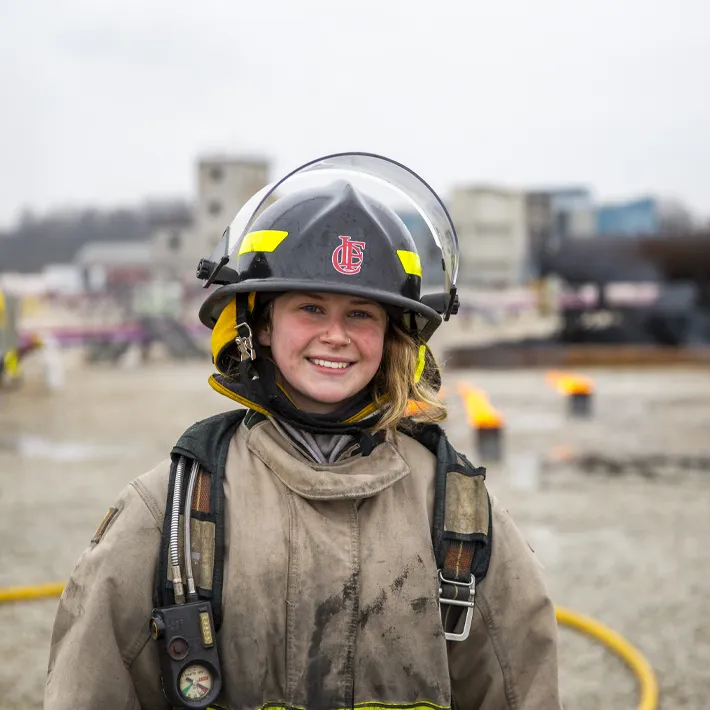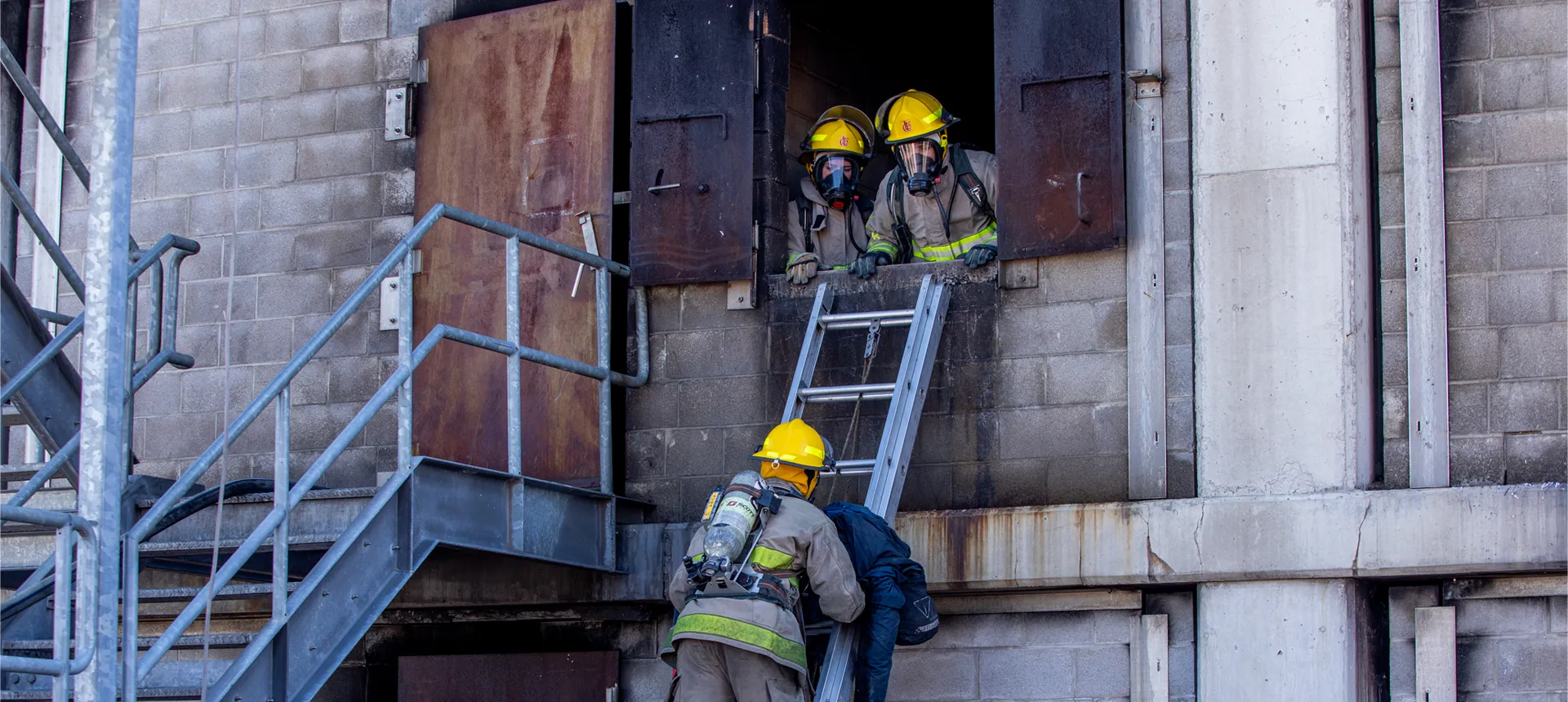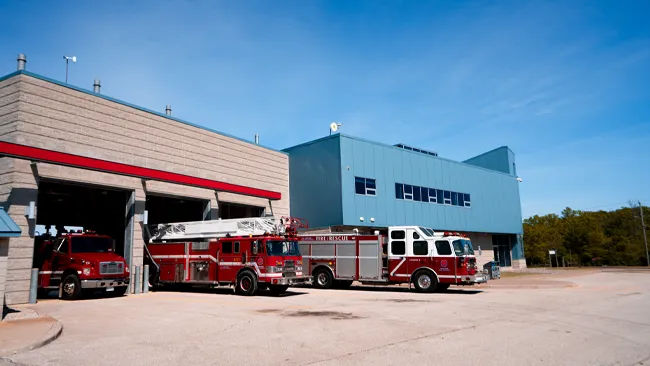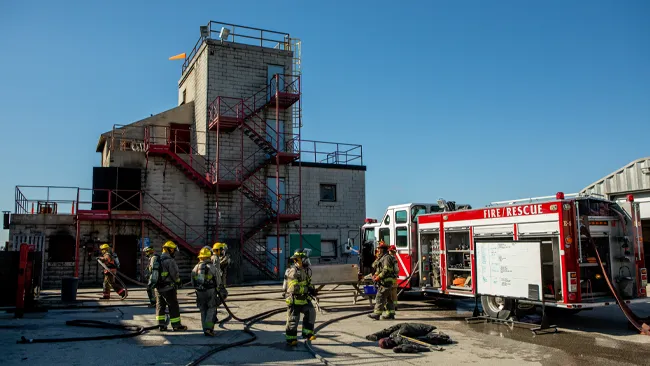Overview
Serve your community; work as a team; face new challengess every day; and make a meaningful difference in people's lives. Be a firefighter!
This 10-month certificate program provides the successful graduate with knowledge and skills in basic fire suppression principles and practices, medical first responder, fire prevention/public education, and specialty modules such as vehicle extrication and environmental hazards. Over 250 hours of skills practice and testing in simulated and controlled live fire training scenarios will be conducted in accordance with current standards indicated in National Fire Protection Association (NFPA) 1001 Firefighter 1 & 2, NFPA 1072 Awareness and Operations.
Curriculum is based on the NFPA standards and includes additional components specifically oriented to gaining employment in fire service.
Graduates of the Pre-Service Firefighter Education & Training program are eligible to participate in OFMEM Provincial Firefighter Testing to obtain their NFPA 1001 Level I and II; NFPA 1072 Awareness and Core operations certifications.
The Fire School Campus - located 14 kilometres from the main campus - is the largest live fire training centre in Canada and includes a hot tower, a search and rescue tower, a fleet of emergency response apparatus, tools and equipment, and an expansive industrial training ground, centred around a state of practice training facility.
Admission Requirements
O.S.S.D. or equivalent with:
- Grade 12 English C or U
- Grade 11 or 12 Mathematics C or U
- Grade 11 or 12 Chemistry C or U (recommended)
Mature Student Assessment for this program is available in the subjects of English and Mathematics for the purpose of demonstrating proficiency in these required admission subjects. For all other admission requirements, applicants must complete the required course(s) as listed above. For more information, please contact counselling@lambtoncollege.ca. Review the Mature Student Admission process.
Academic admission requirements can be obtained through Academic Upgrading and the Pre-Programs at Lambton College.
First Aid & CPR
It is recommended that students entering this program are current on Standard First Aid and CPR Level C.
Gabriela's Story
Gabriela has wanted to be a firefighter since she was three years old. Find out why she chose to study at Lambton College.
Costs
- Year 1 $7,546.88
Please Note: These fees apply to the 2023-2024 academic year and are subject to change. Fees do not include books (unless specifically noted), supplies or living costs.
Additional Fees
-
PPE (helmet, gloves, fire boots, balaclava, vehicle extrication gloves, safety shoes, and glasses)$825.00
-
Bunker Gear Rental$720.00
-
Uniform (pants, belt, shirt)$120.00
-
Rope Gloves$170.00
-
Mask Fit Testing & Accountability Badge$85.00
-
Red Cross Material and Administration Fee$35.00
Recommended Fees
In addition to the items listed, the following fees are also recommended:
- OFMEM Testing - fees determined by the OFMEM
- Vehicle extrication gloves and rope gloves
- Travel - Students are responsible for travelling between main campus and the Fire School (14 km) - carpooling is encouraged.
Technology Requirements
In order to keep pace with the requirements of each and every course in your program, Lambton College requires that each student have access to a laptop while studying at our college.
Labs & Equipment
Courses
Fireground Operations I
This course is the first of three that will provide the firefighter student with the basic components of Fireground Operations. The education and training is based on the skills and knowledge required for certification as a firefighter in accordance with the NFPA 1001 (2019) Levels I and II Job Performance Requirements (JPRs) and required skills as listed by the section of the standard in the course Learning Outcomes. The student will describe, demonstrate and perform the skills and knowledge required to fulfil the course requirements in accordance with the listed sections of NFPA 1001 (2019) and the current skills and knowledge requirements. Evaluations will be conducted in accordance with the Academic Standards and Evaluation (AS&E) branch of the Ontario Office of the Fire Marshall and Emergency Management (OFMEM). Successful students will obtain both the International Fire Service Accreditation Congress (IFSAC) certification and ProBoard certification.
Environmental Protection & Rescue Operations
This module provides an overview of basic components of environmental hazards and rescue operations to the National Fire Protection Association (NFPA) standards: 1001 (2019) Firefighter Level I & II; and 1072 (2017) Hazardous Materials Awareness and Operations. Students will acquire the knowledge and skills performance, in accordance with the Job Performance Requirements (JPRs) and the required skills as listed by the section of the standard in the course Learning Outcomes. Student will describe, demonstrate and perform the skills and knowledge required to fulfill the course requirements in accordance with the listed sections of NFPA 1001 (2019), and NFPA 1072 (2017) levels. Evaluations will be conducted in accordance with the Academic Standards and Evaluation (AS&E) branch of the Ontario Office of the Fire Marshall and Emergency Management (OFMEM). Successful students will obtain both the International Fire Service Accreditation Congress (IFSAC) certification and ProBoard certification.
Workplace Communications
This course focuses on skills required in any organization or position: writing business documents, responding to realistic scenarios, and speaking in an organized and vibrant manner. Students will practice professional and inclusive communications skills by producing, revising, and editing short business documents and engaging in verbal interactions and presentations.
Fire Science Fitness I
This course introduces the student to the various aspects of firefighter fitness training including both theory and practice. Special emphasis is placed on cardiovascular endurance, and flexibility. Students will examine the mental aspects of fitness training, job performance tasks, principles of fitness training, nutritional guidelines and basic strategies to maintain lifelong fitness. Various physical training techniques designed to increase or maintain the student's present level of physical fitness and enable the student to successfully pass the York University Fire Fighter Fitness/Recruit Test are engaged in.
Job Search & Success
This course provides student with skills and knowledge to help support their career search and succeed in the workplace. Students align their personal skill set and goals to guide them on their career paths. They will learn how to effectively conduct a job search, build a professional and well-tailored resume and cover letter, and develop and practice interview techniques. Students will also develop their personal brand to help support effective career networking and aid in their job search. Teamwork and collaboration in the workplace are also discussed. Self-reflection is used to inspire insight and support their professional career journey.
General Education Elective
Fire Ground Operations II
This course is the second of three that will provide the firefighter student with the basic components of Fireground Operations. The education and training are based on the skills and knowledge required for certification as a firefighter in accordance with the NFPA 1001 (2019) Levels I + II and NFPA 1006 (2013) Chapter 5 Job Performance Requirements (JPRs) and required skills as listed by the section of the standard in the course Learning Outcomes. The student will describe, demonstrate and perform the skills and knowledge required to fulfil the course requirements in accordance with the listed sections of NFPA 1001 (2019) and the current skills and knowledge evaluations conducted in accordance with the Academic Standards and Evaluation (AS&E) branch of the Ontario Office of the Fire Marshall and Emergency Management (OFMEM). Successful students will obtain both the International Fire Service Accreditation Congress (IFSAC) certification and Pro Board certification.
Fire Ground Operations III
This course is the third of three that will provide the firefighter student with the basic components of Fireground Operations. The education and training is based on the skills and knowledge required for certification as a firefighter, in accordance with the NFPA 1001 (2019) Level I and II, Job Performance Requirements (JPRs) and required skills as listed by the section of the standard in the course Learning Outcomes. The student will describe, demonstrate and perform the skills and knowledge required to fulfill the course requirements in accordance with the listed sections of NFPA 1001 (2019). Successful students will be eligible to obtain both the International Fire Service Accreditation Congress (IFSAC) certification and ProBoard certification through evaluations conducted in accordance with the Academic Standards and Evaluation (AS&E) branch of the Ontario Office of the Fire Marshal and Emergency Management (OFMEM).
Firefighter Emergency Patience Care
This course provides an overview of the Ontario emergency medical care system (EMS) and specific roles of members of the emergency response team. Content will cover common medical/trauma conditions, related patient care and associated situational management. Emphasis will be on the specific role and responsibilities of the firefighter emergency patient care responder and the teamwork essential to the effectiveness of the EMS response. Included will be legislation, regulations, standards and established policies, procedures and protocols as well as the role of members of the emergency response team and the specific role of the firefighter emergency care responder in accordance with current Canadian Red Cross First Responder program standards.
Fire Science Fitness II
The focus of this course is to help prepare the student for the severe physical demands of fire fighting. Various methods of training will be incorporated in order to improve the student's fitness level. A progressive program of cardiovascular, flexibility, muscular strength and endurance will be implemented. There will be an emphasis on muscular strength/endurance and flexibility training throughout the course.
Behaviour Health for First Responders
The current climate in first response demands that service providers be proactively prepared with a keen awareness of the demands of the job both personally and professionally. Students who take this course will develop essential self-awareness skills, enhance their knowledge of mental health issues in themselves and others, learn to foster collegiality through team work, and augment their understanding of the impact of workplace dynamics on one's mental health. Successful completion of the course will result in improved resiliency to meet the demands of a career in first response.
Provincial Testing & Skills Evaluation
This course will provide the student with an opportunity to review and be evaluated on their ability to perform fire service skills. Skills review and evaluations are based on the minimum Job Performance Requirements (JPRs) for the applicable National Fire Protection Association (NFPA) standard. Skills are selected from the entire Pre-Service Firefighter Education & Training program and are required for certification as a firefighter in the province of Ontario, and in accordance with NFPA 1001 (2019) Level I and II; NFPA 1072 (2017); and NFPA 1006 (2013) Chapter 5. JPRs and required skills are listed by the section of the applicable standard in the course Learning Outcomes. The student will describe, demonstrate, and perform the skills required to fulfill the course requirements in accordance with the listed sections of the applicable NFPA standard. Through review and successful skills evaluation, the student will be eligible to obtain both the International Fire Service Accreditation Congress (IFSAC) certification and ProBoard certification through evaluations conducted in accordance with the Academic Standards and Evaluation (AS&E) branch of the Ontario Office of the Fire Marshal and Emergency Management (OFMEM).
Contact
Program Information
1-844-LAMBTON
School of Fire Science, Health & Community Services
After Graduation
Employment Opportunities

Typical opportunities that are available to graduates of this certificate program include positions in municipal fire departments, in the fields of fire suppression and fire prevention.
Consideration for Employment
In order to be eligible for consideration for employment in a municipal fire department within the Ontario fire service, you are required to:
- Work on rotating shifts, including nights, weekends, and holidays
- Speak, read, and write English fluently and communicate clearly and precisely in high pressure situations
- Have a current Standard First Aid certificate and a valid CPR level BLS (Basic Life Support)
- Be 18 years of age or older at the time of application and possess O.S.S.D. Grade 12 or academic equivalency
- Be legally entitled to work in Canada (citizen/landed immigrants) and free of any criminal convictions for which a pardon has not been granted
- Some fire departments require candidates to meet the NFPA 1582 Vision Standards while others will set their own hiring criteria
More Information
Skill Demands
All students are required to meet the following demands:
- Applicants must be able to lift a bulk mass of 18 kg (40 lbs) and have the ability to dismantle and assemble large pieces of equipment.
- Must climb vertical ladders and walk in elevated ares and on platforms with open grates.
- Will not be allowed to wear glasses when wearing breathing apparatus. Accommodations may apply.
- Must be clean shaven to ensure a good seal with the face mask.
- Some students with disabilities may require academic accommodation to equalize opportunities to meet the academic demands of a course or program.
- A medical certificate indicating an ability to perform the duties of a firefighter may be required by the College.
- First aid and CPR are highly recommended at the start of the program
Technology Requirements
It is recommended that students purchase a laptop with a Windows operating system.
Internet Speed Requirements
For best performance for students learning remotely, an internet connection with a minimum of 40 Mbps download and 10 Mbps upload speed is recommended in order to effectively use video conferencing and remote lecture delivery software as well as, other online resources remotely. Due to the large area over which students may be dispersed, we are unable to recommend a specific provider, so you will need to inquire around your area to find one that best suits your needs.
Minimum Laptop Requirements
In order to access the internet and virtually-delivered software and courseware, student laptops should include the following at a minimum. By meeting the following specifications, students will be equipped to access software and courseware on their laptop through the internet:
- Intel i5 8th Gen Processor or equivalent
- 16 GB of RAM (with a minimum of 8 GB)
- 100 GB HDD or more
- HD Graphics
- Webcam with a microphone
- Wireless 802.11n/ac 5ghz capable
- Windows Operating System (Windows 11)
Software
To ensure students are getting the most our of their classroom experience, some software will be required.
Lambton College has made this software easily accessible online. Students can leverage our Microsoft Office 365 software packages and services. In addition, much of the software you require for your courses will be available on demand for use on any device - on or off campus.


